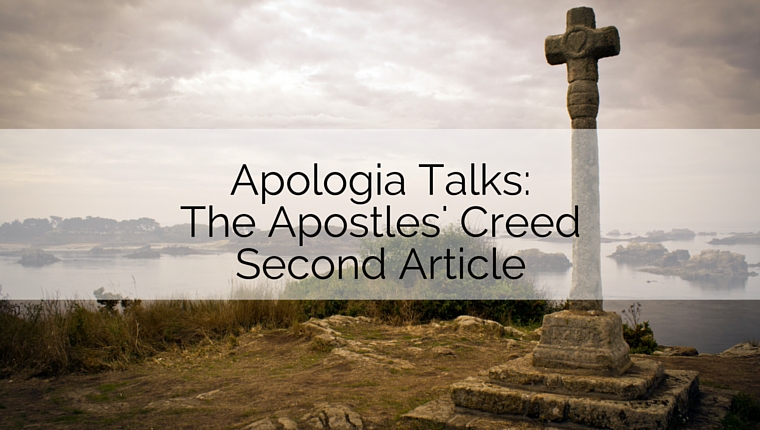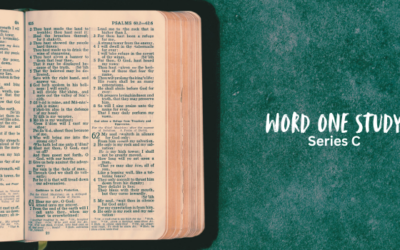Download a PDF of the Start a Conversation about the Apostles’ Creed Second Article.
And [I believe] in Jesus Christ, His only Son, our Lord, who was conceived by the Holy Spirit, born of the Virgin Mary, suffered under Pontius Pilate, was crucified, died and was buried. He descended into hell. The third day He rose again from the dead. He ascended into heaven and sits at the right hand of God, the Father Almighty. From thence He will come to judge the living and the dead.
Introduction to the Apostles’ Creed
The Apostles’ Creed was first formed in approximately the year 150 and was known as “symbol of the faith.” Historically, “symbol” meant the token that a messenger took with him or her to prove themselves to be a trustworthy source. When you say the words of the Apostles’ Creed you recognize yourself as a believer of what the creed says. The Apostles’ Creed is the most common creed used in western Christianity. Some Christian denominations do not use creeds, typically because the common creeds used by churches are not found as whole statements in Scripture, yet all parts of the creeds are Scripturally based. Creeds are a summary of Christian doctrine. Each article starts with “I” and not “We” because of its use as a baptismal creed. The Apostles’ Creed is deeply personal. What this creed and others allude in its structure is that Christians believe in the only true triune God – Father, Son, and Holy Spirit. The three articles of the Creed correspond to the three works of God: creation, redemption and sanctification. They also correspond to the three Persons of the Trinity, though in such a way that the external works of God remain indivisible. Other creeds get more specific on how the Bible has been interpreted and its statements about the Holy Trinity. Think of the Apostles’ Creed as a doctrine 101 of the Christian Church.
What the Creed does for us: To know Him perfectly, to know how to obtain the strength to carry out the 10 Commandments, a response and confession of Christians based on the first commandment… (The Large Catechism)
Here in the Creed you have the entire essence, will, and work of God exquisitely depicted in very brief but rich words. (The Large Catechism)
Introduction to the 2nd Article
This article of the creed concerns God the Son, the person of Jesus Christ. The article transitions from Christ’s incarnation, His earthly story and His awesome power to illustrate the two natures of Christ – divine and human. Often this article has been nicknamed “On Redemption,” as it unfolds the narrative of how all of humanity is able to be redeemed and brought back into the family of God. This promise of redemption was given to us at the fall into sin [Genesis 3:15].
The 2nd article makes up the majority of the Apostles’ Creed, which is still a brief summary of Jesus Christ’s existence, earthly duration and second coming. To unpack this article, you are confessing that Jesus Christ was in a state of humiliation from His conception inside Mary until He died on the cross, and that all that came after this and forever to come is His state of exaltation. The entirety of the article speaks to Jesus Christ’s work of redemption or atonement for humanity’s original sin and sinful acts. He is the Lamb of God who takes away the sin of the world [John 1:29]. Have mercy on us!
Scripture Connect
- John 1:1-2, 14 – In the beginning was the Word, and the Word was with God, and the Word was God. He was God in the beginning…The Word became flesh and made His dwelling among us. We have seen His glory, the glory of the One and Only, who came from the Father, full of grace and truth.
- Matthew 28:18, 20 – All authority in heaven and on earth has been given to Me…Surely I am with you always, to the very end of the age.
- John 3:36 – Whoever believes in the Son has eternal life, but whoever rejects the Son will not see life, for God’s wrath remains on him.
- John 5:22-23 – The Father judges no one, but has entrusted all judgment to the Son, that all may honor the Son just as they honor the Father. He who does not honor the Son does not honor the Father, who sent Him.
- 1 Timothy 2:5 – There is one God and one mediator between God and men, the man Christ Jesus.
- Hebrews 2:14 – Since the children have flesh and blood, He too shared in their humanity so that by His death He might destroy him who holds the power of death –that is, the devil.
- 1 Corinthians 6:20 – You were bought at a price. Therefore honor God with your body.
- 2 Timothy 1:10 – Our Savior, Christ Jesus…has destroyed death and has brought life and immortality to light through the gospel.
- Isaiah 53:5 – By His wounds we are healed.
- Revelation 1:7 – Look, He is coming with the clouds, and every eye will see Him, even those who pierced Him; and all the peoples of the earth will mourn because of Him. So shall it be! Amen.
Doctrinal Quotation
- What does this mean? I believe that Jesus Christ, true God, begotten of the Father from eternity, and also true man, born of the Virgin Mary, is my Lord, who has redeemed me, a lost and condemned person, purchased and won me from all sins, from death, and from the power of the devil; not with gold or silver, but with His holy, precious blood and with His innocent suffering and death, that I may be His own and live under Him in His kingdom and serve Him in everlasting righteousness, innocence, and blessedness just as He is risen from the dead, lives and reigns to all eternity. This is most certainly true. – Luther’s Small Catechism
- …in order both to be a sacrifice not only for original sin but also for all other sins and to conciliate God’s wrath – Augsburg Confession: Article II Original Sin German Text
- …that he [Jesus Christ] might reconcile the Father to us and be a sacrifice not only for original guilt but also for all actual sins of human beings. – Augsburg Confession: Article II Original Sin Latin Text
- There was no counsel, no help, no comfort for us until this only and eternal Son of God, in his unfathomable goodness, had mercy on us because of our misery and distress, came from heaven to help us…He has snatched us, poor lost creatures, from the jaws of hell, won us, made us free, and restored us to the Father’s favor and grace…He did all this so that he might become my LORD. For he did none of these things for himself, nor had he any need of them…Upon it [the gospel] all our salvation and blessedness are based, and it is so rich and broad that we can never learn it fully. – Large Catechism: The Creed
Application
God the Father does more than give temporal blessings to you; He withholds nothing from you by putting His Son, Jesus Christ, in your place.
This article begins with using both names Jesus and Christ – Jesus, “the Lord saves,” is His personal name and Christ, “the Anointed,” speaks to His work as prophet, priest and king. Sometimes these three special jobs are referred to as the threefold office of Christ.) You use both names together because Jesus wants to know you on a personal level and He also means business. With your friends you do not call each other by full names. You might have nicknames for each other. Jesus gets you. He lived humanity’s joys and troubles. Christ did not come to only be your friend. He is more than that. Christ is scary powerful. He released people from demons and endured the cross for you. Jesus Christ will judge both the living and the dead! He can relate to the grip of sin on humanity – He was tempted and His disciples were constantly overcome by sin. Friends do not commit to that kind of level. Try using these two names together when you talk about Him in the coming days. See how powerful and warm it is.
The 2nd Article is the first mention of another life after death. Jesus Christ humiliated and exalted Himself so you could have eternal life. Are you living a life that has been redeemed back from the devil and the devil’s schemes? If not, repent and believe that your sins are forgiven. Do not let the world’s lies seep into your heart. You are treasured and valued.
As a Christian you wear Christ’s name through your Baptism. How can you imitate Jesus? What is one way you will do that this week, month, year? Will this be in how you handle suffering? Judging with mercy? Asking God the Father’s will to be done?
References
Kolb, R., & Wengert, T.J. (2000). The Book of Concord: The Confessions of the Evangelical Lutheran Church. Minneapolis, MN: Fortress Press
Luther’s Small Catechism with Explanation. St. Louis, MO: Concordia Publishing House











0 Comments